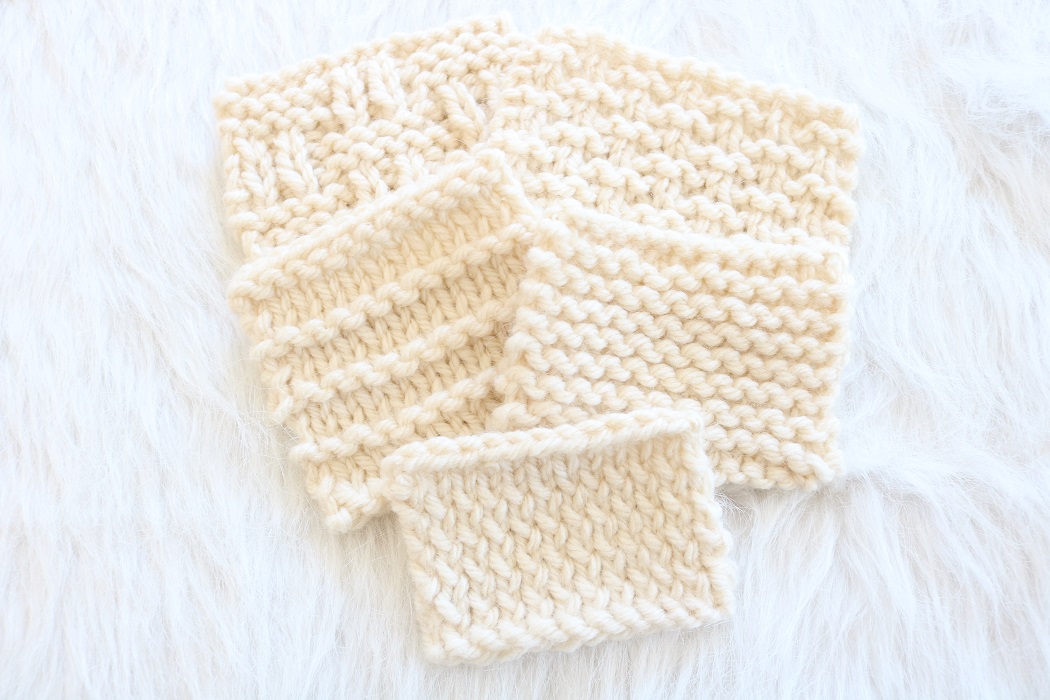
Easy Knitting Stitch Patterns {for beginners}
If you are fairly new to knitting, it’s a great idea to make some practice swatches of common stitch patterns. There are a multitude of stitch patterns that just consist of various combinations of knit and/or purl stitches. Here I’ve gathered a list of 12 easy knitting stitch patterns that are simple and create beautiful projects!
So… what are some easy knitting stitch patterns for beginners? My list of 12 of my favorite knit stitch patterns will get you started.
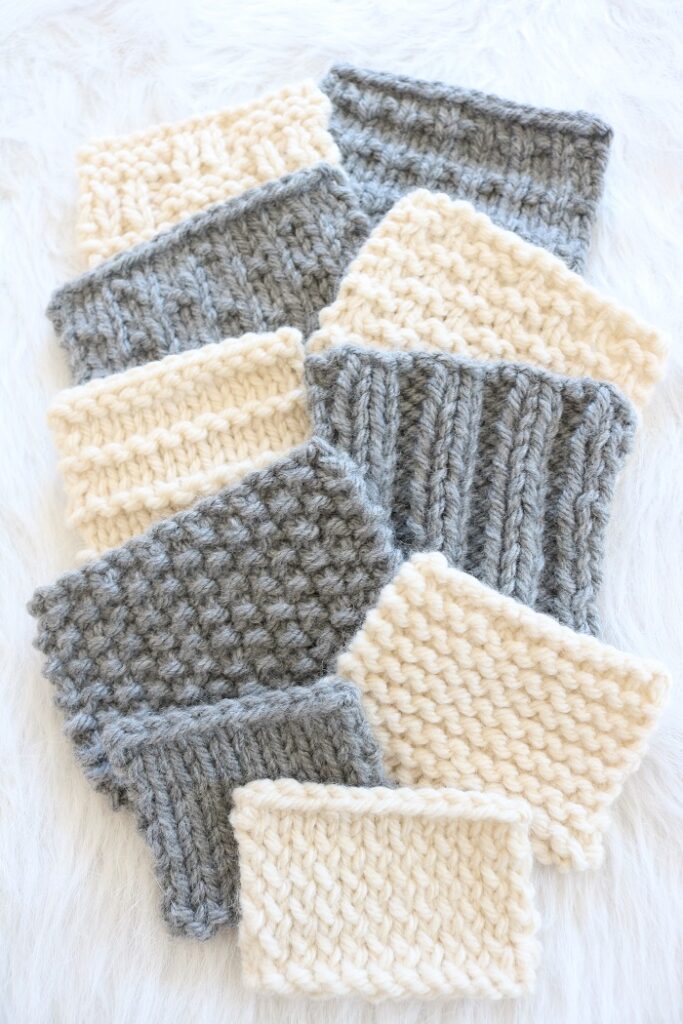
What is the easiest knitting stitch to make?
Related questions are:
- What is the easiest knit stitch for beginners?
- What is the most common stitch in knitting?
The simplest answer to these questions is the GARTER STITCH. It is the first stitch pattern on my list for this reason.
But before we get to the list…are you just learning how to knit? Visit my article (with videos!) on HOW TO KNIT and grab yourself a FREE knitting guide. You can learn the basic knitting stitches there first.
Ready to tackle some knitting stitch patterns? Here we go…
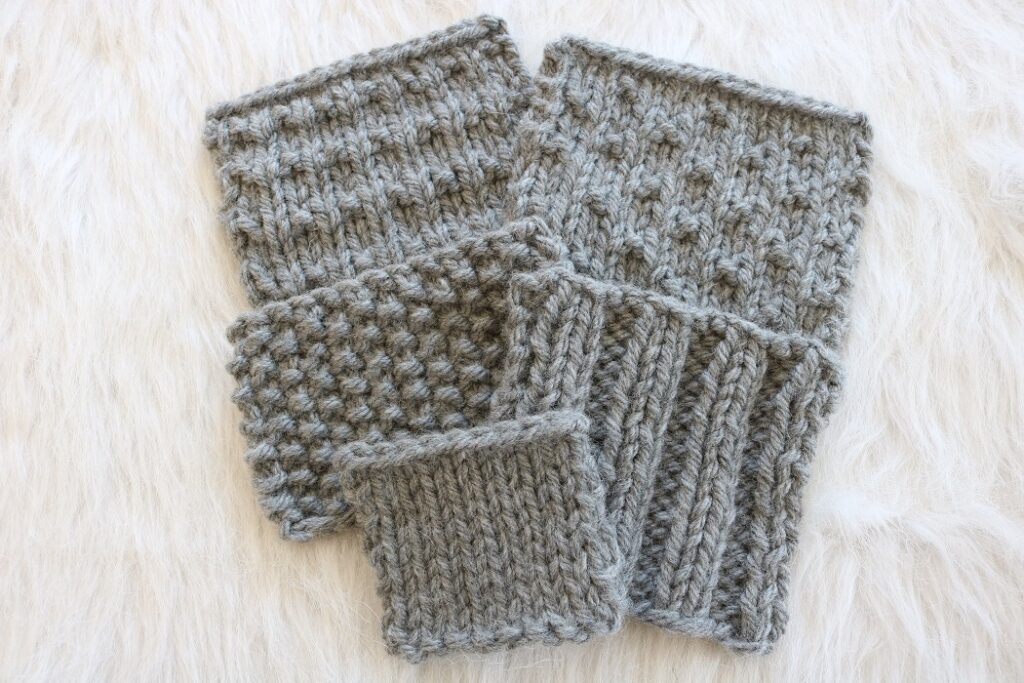
EASY KNITTING STITCH PATTERNS for Beginners
First, let’s get familiar with some common knitting term abbreviations that you will see in knitting patterns:
Knitting Abbreviations
K – Knit
P – Purl
RS – Right Side
WS – Wrong Side
Rep – repeat
[ ] – repeat what is inside brackets the designated number of times
Easy Knitting Stitches – LIST
This list of knit stitch patterns includes instructions for every row in each pattern. Many instructions require a repeat of multiple rows to produce the stitch pattern.
Each stitch pattern will note which side is the Right Side (RS) to be shown (versus the Wrong Side (WS) which will not be shown) if that is relevant.
Following each stitch pattern you will find a photo of a knitting sample (swatch) using this pattern. I tell you exactly how many stitches and rows I knitted to make each sample. For reference, I used U.S. size 10 (6mm) knitting needles and size 5 (Bulky) yarn for most of my samples.
After creating my samples, I wet-blocked them and the loose ends were woven in. To wet-block your samples, simply spray them with water and pin to a blocking mat (or thick towel). Let dry:
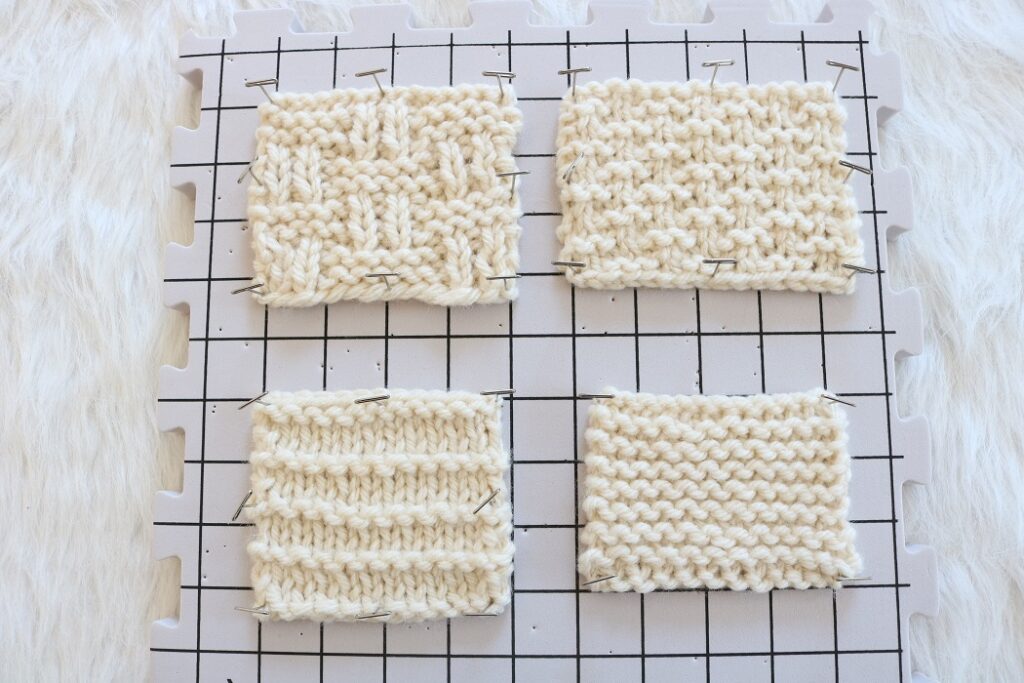
Be sure to make samples of these patterns yourself to practice the stitches. You can save them for future reference, in case you wish to design your own dishcloth or scarf using your favorite pattern.
Would you like a FREE printable of these 12 stitch patterns? Grab the 12 FREE stitch patterns plus these sample (swatch) labels to keep track of yours.
You can use the sample labels for both knitting and crochet swatches:
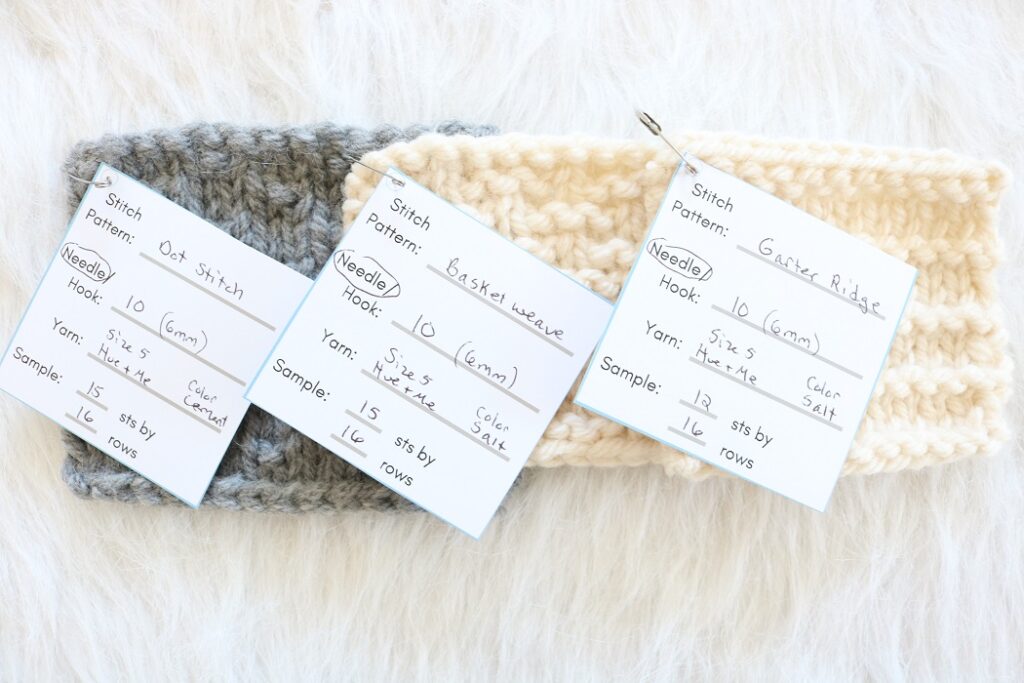
——————————————————————————————————————–
The following beginner knit stitch patterns can be worked on any number of stitches:
Garter Stitch
The instructions for the garter stitch pattern couldn’t be simpler:
Knit every row.
This sample has 12 stitches and 15 rows:
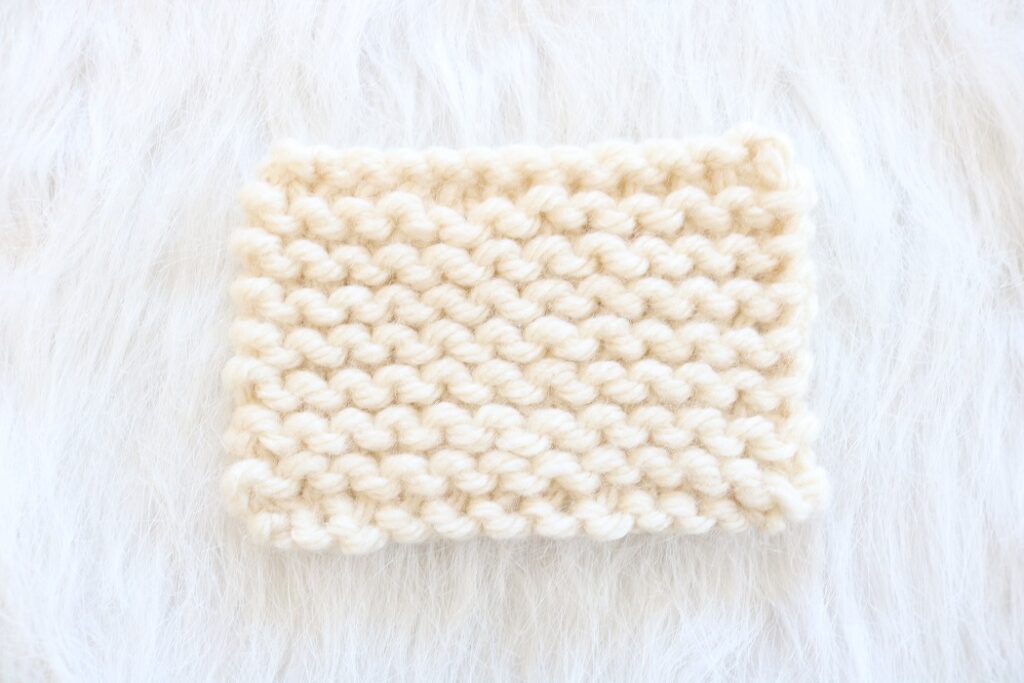
Garter Ridge Stitch
Rows 1 and 3 (RS): Knit.
Row 2: Purl.
Row 4: Knit.
Rep Rows 1-4 for pattern.
This sample has 12 stitches and 16 rows:
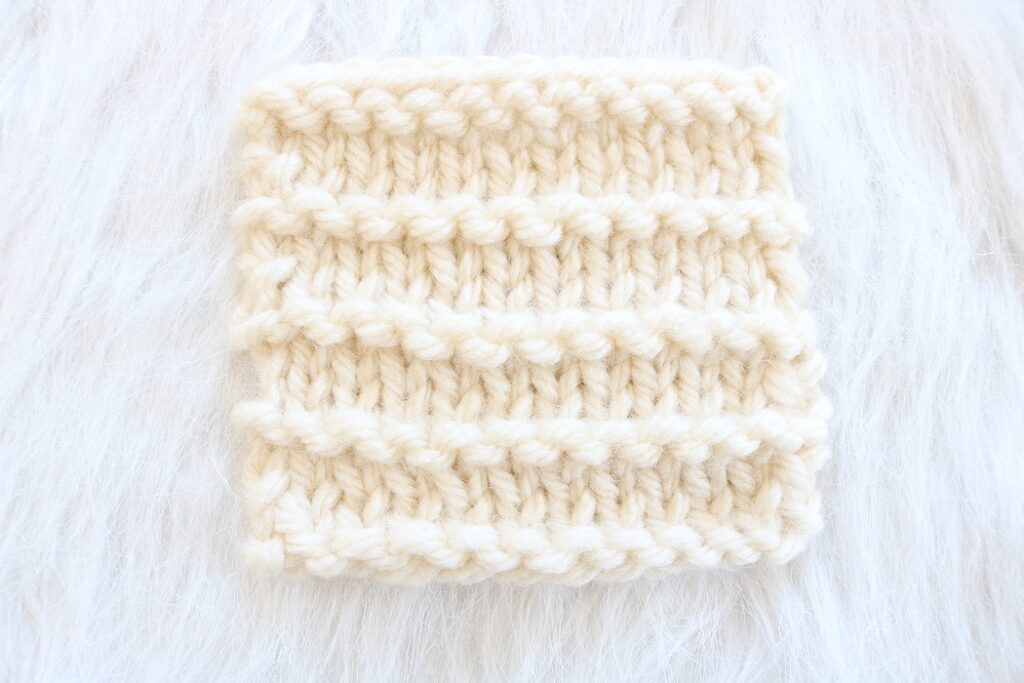
Stockinette Stitch
Row 1 (RS): Knit.
Row 2: Purl.
Rep Rows 1-2 for pattern.
This sample has 10 stitches and 10 rows:
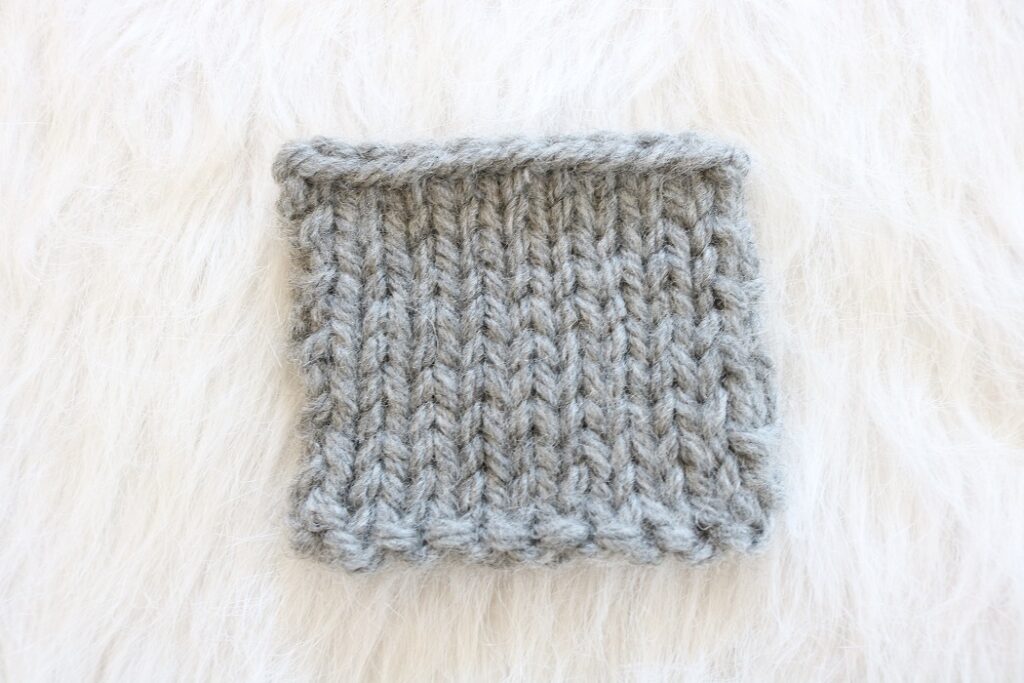
Reverse Stockinette Stitch
Row 1 (RS): Purl.
Row 2: Knit.
Rep Rows 1-2 for pattern.
This sample has 10 stitches and 10 rows:
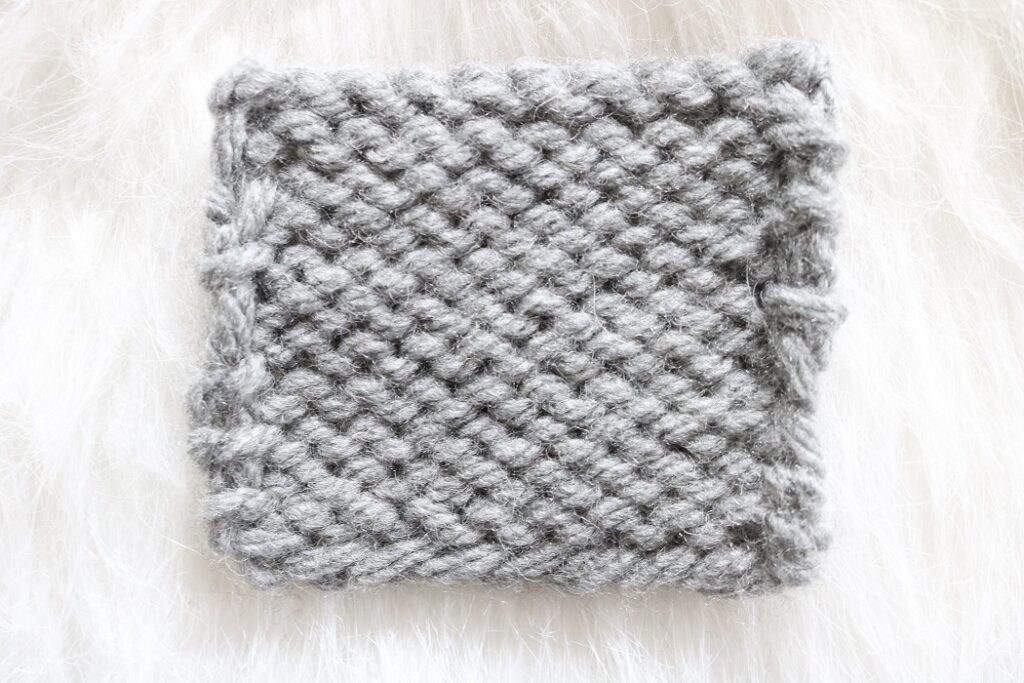
Twisted Stockinette Stitch
Row 1 (RS): Knit into the back loop of each stitch.
Row 2: Purl.
Rep Rows 1-2 for pattern.
This sample has 12 stitches and 10 rows:
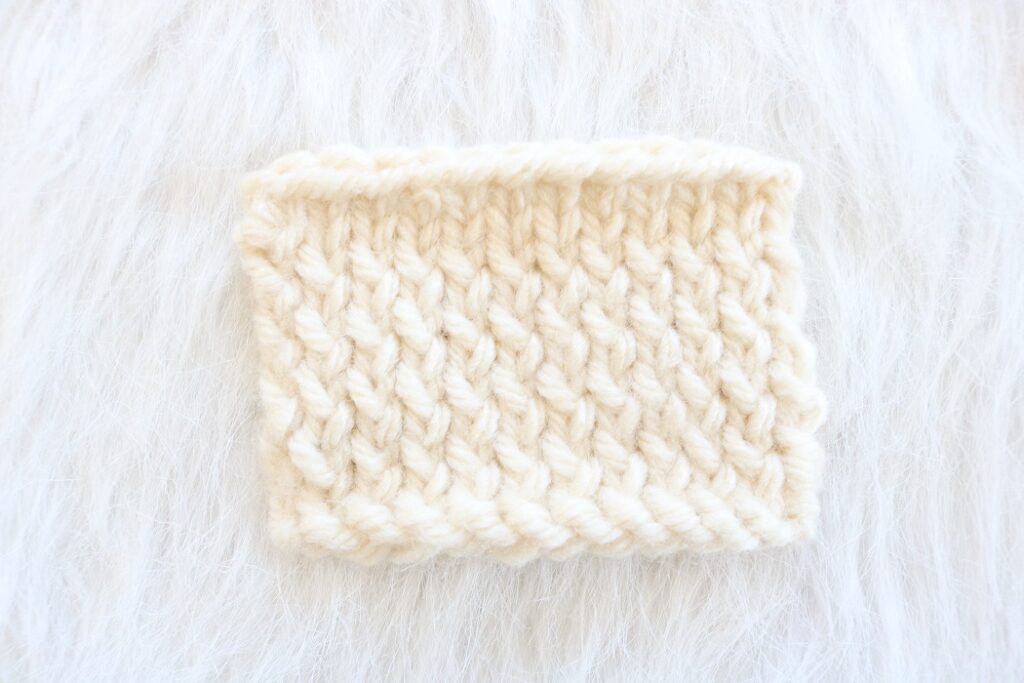
——————————————————————————————————————–
The next group of knitting stitches for beginners require a certain number of stitches to be worked:
Ribbing
K1, p1 ribbing can be worked for an odd # of stitches as follows:
Row 1 (RS): K1, *p1, k1; rep from * to end.
Row 2: P1, *k1, p1; rep from * to end.
Rep Rows 1-2 for pattern.
K2, p2 ribbing can be worked for a # of stitches that is a multiple of 4 plus 2 extra as follows:
Row 1 (RS): K2, *p2, k2; rep from * to end.
Row 2: P2, *k2, p2; rep from * to end.
Rep Rows 1-2 for pattern.
This sample of k2, p2 ribbing has 16 stitches and 16 rows:
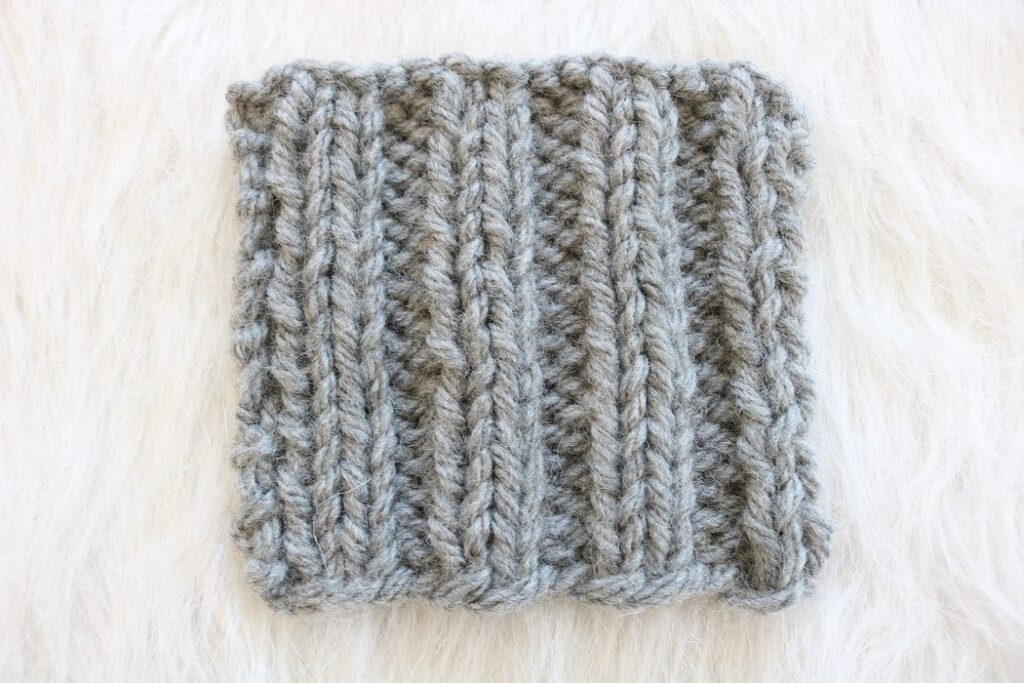
Seed Stitch
Must be worked on a multiple of 2 plus 1 stitch as follows:
Row 1: K1, *p1, k1; rep from * to end.
Rep Row 1 for pattern.
This sample has 13 stitches and 14 rows:
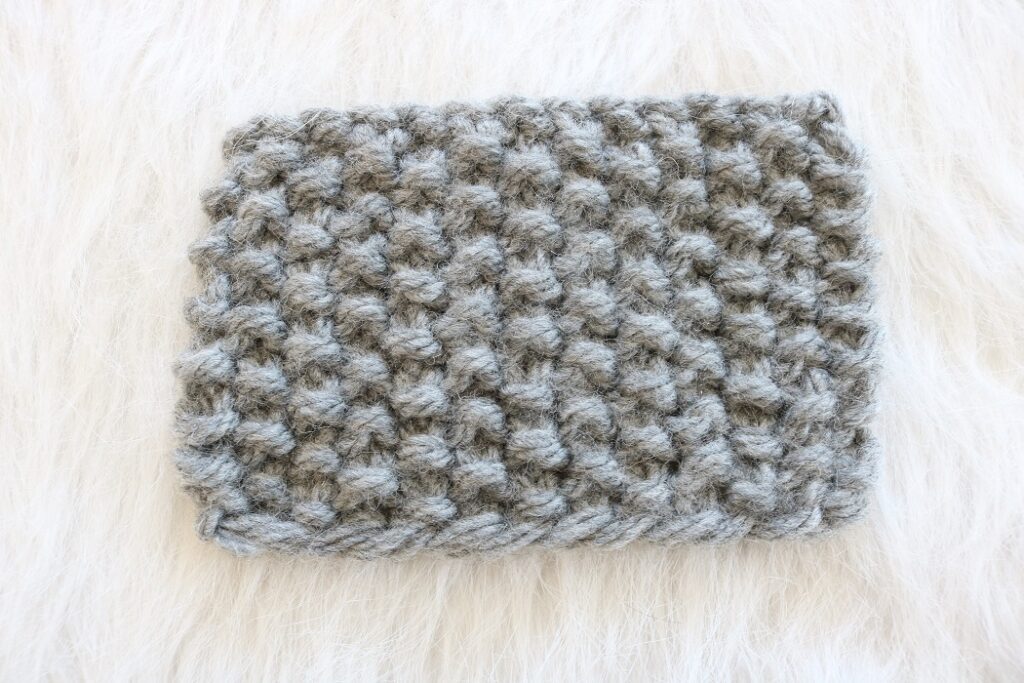
Dot Stitch
Must be worked on a multiple of 4 plus 3 stitches as follows:
Row 1 (RS): K1, *p1, k3; rep from * to last 2 sts, p1, k1.
Row 2: Purl.
Row 3: *K3, p1; rep from * to last 3 sts, k3.
Row 4: Purl.
Rep Rows 1-4 for pattern.
This sample has 15 stitches and 16 rows:
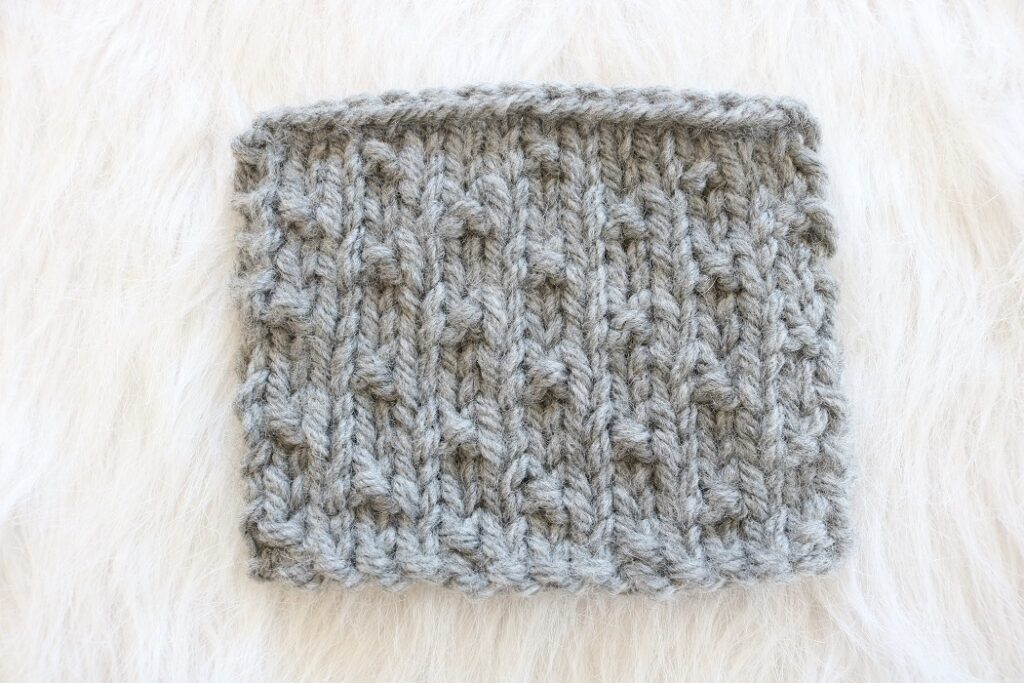
Fleck Stitch
Must be worked on a multiple of 2 plus 1 stitch as follows:
Row 1 (RS): Knit.
Row 2: Purl.
Row 3: K1, *p1, k1; rep from * to end.
Row 4: Purl.
Rep Rows 1-4 for pattern.
This sample has 15 stitches and 16 rows:
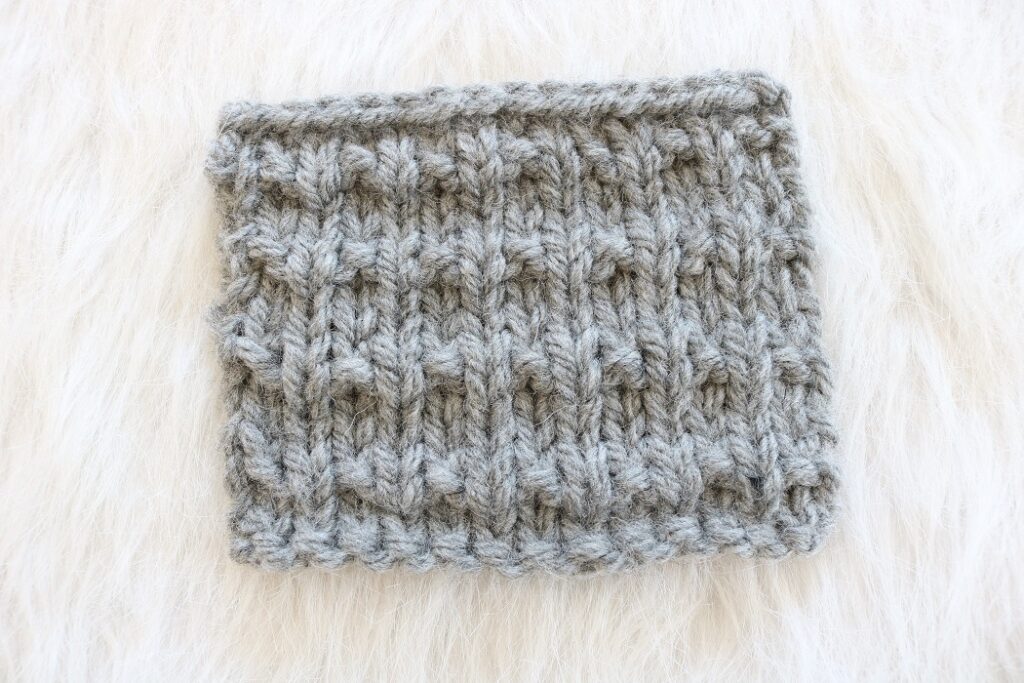
——————————————————————————————————————–
The next group of knitting stitch patterns may be a little more challenging, but produce gorgeous textures similar to baskets…
Basketweave Stitch
Must be worked on a multiple of 4 plus 3 stitches as follows:
Rows 1 (RS) and 3: Knit.
Row 2: *K3, p1; rep from * to last 3 sts, k3.
Row 4: K1, *p1, k3; rep from * to last 2 sts, p1, k1.
Rep Rows 1-4 for pattern.
This sample has 15 stitches and 16 rows:
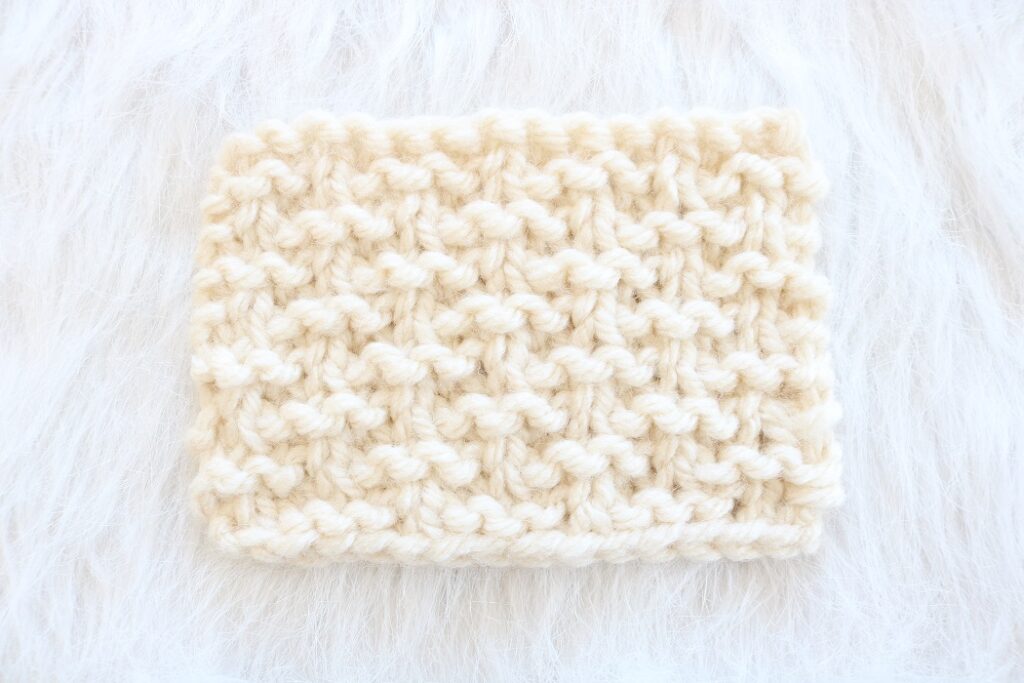
Small Basket Stitch
Must be worked on a multiple of 10 plus 5 stitches as follows:
Row 1 (RS): [K1, p1] twice, *k7, p1, k1, p1; rep from * to last st, k1.
Row 2: P1, [k1, p1] twice, *k5, [p1, k1] twice, p1; rep from * to end.
Rows 3-4: Rep the last 2 rows once more.
Row 5: K6, *p1, k1, p1, k7; rep from * to last 9 sts, p1, k1, p1, k6.
Row 6: *K5, [p1, k1] twice, p1; rep from * to last 5 sts, k5.
Rows 7-8: Rep the last 2 rows once more.
Rep Rows 1-8 for pattern.
This sample has 15 stitches and 16 rows:
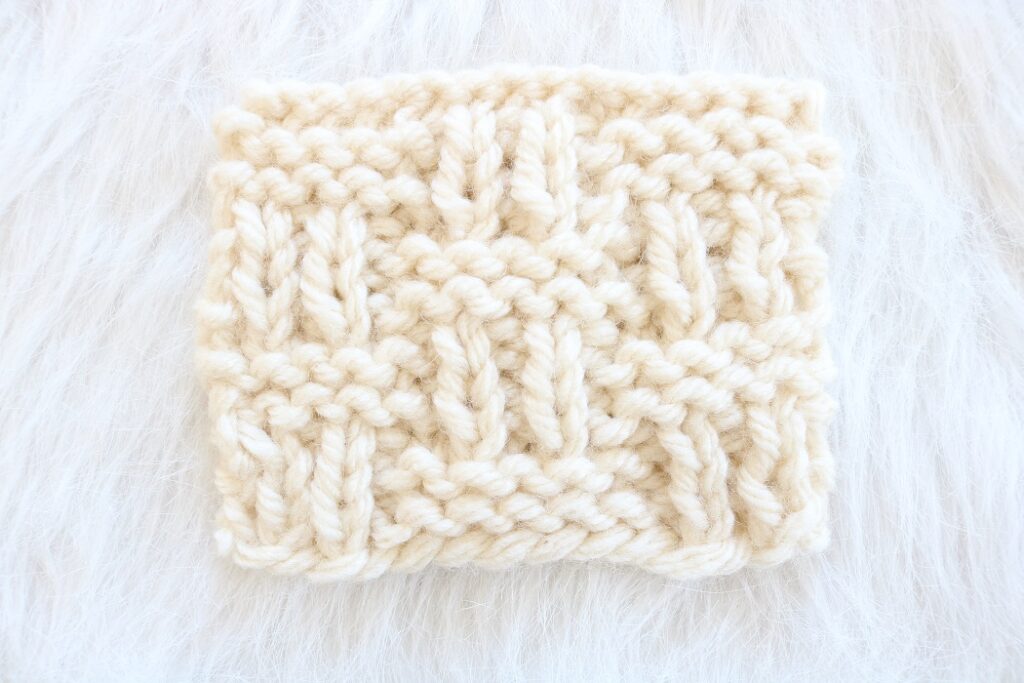
Garter Stitch Checks Stitch
Must be worked on a multiple of 10 plus 5 stitches as follows:
Row 1 (RS): K5, *p5, k5; rep from * to end.
Row 2: Purl.
Rows 3-4: Rep the last 2 rows once more.
Row 5: Rep Row 1.
Row 6 (WS): K5, *p5, k5; rep from * to end.
Row 7: Knit.
Rows 8-9: Rep the last 2 rows once more.
Row 10: Rep Row 6.
Rep Rows 1-10 for pattern.
I use this stitch pattern for the dishcloth in my “Tackle the Tea Towel” beginner knitting course :
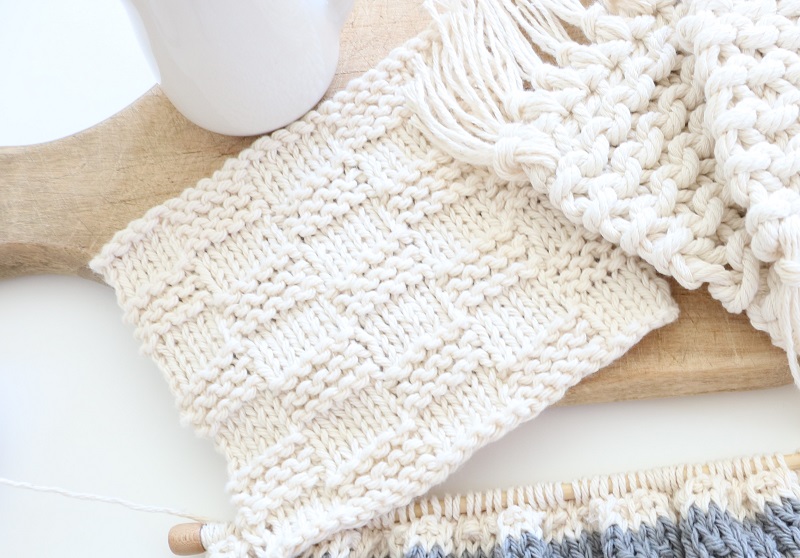
Tell me…which is your favorite of these easy knitting stitches for beginners? My favorite happens to be the Basketweave Stitch, because I’m a big fan of baskets.
Once you’re ready to tackle full knitting patterns, check out my LIST OF 20+ BEGINNER KNITTING PATTERNS. I know you can find one for your skill set. I have some great options for knitting patterns in my ETSY SHOP, too.
——————————————————————————————————————–
Do you wish you could really learn how to knit beautiful things?
Click here to master basic knitting skills in under 2 weeks – even if you are a complete beginner, intimidated by mistakes, and lack design coordination!
KNITTING COURSE —>
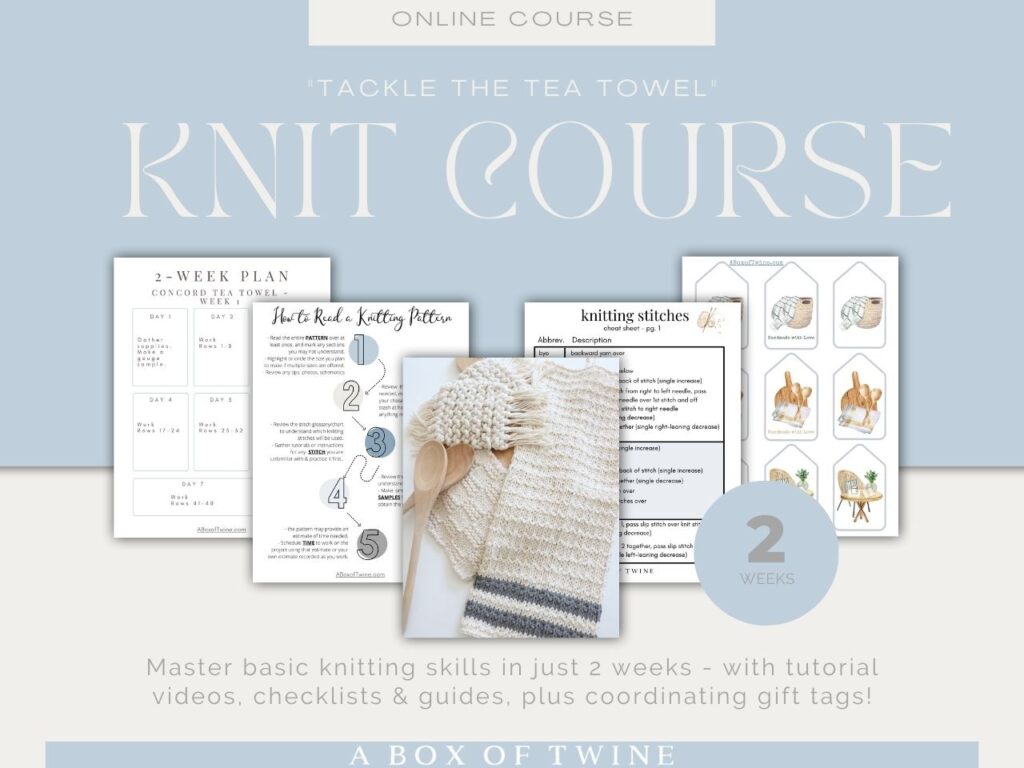
——————————————————————————————————————–
FREE Knitting Stitch Patterns and labels!
Once you make several practice samples of these stitch patterns, you may wish to save them for future reference. They come in handy when deciding which patterns you’d like to try again or use on a custom design (e.g. for a dishcloth or scarf).
It is helpful to identify which stitch pattern you used on your samples. Why not use the sample labels that are included in the FREE PRINTABLE available in this post? (scroll up near beginning of this post to Subscribe & get them)
These labels measure about 2.5″ square. Here is one of my stitch pattern samples with a label pinned to it:
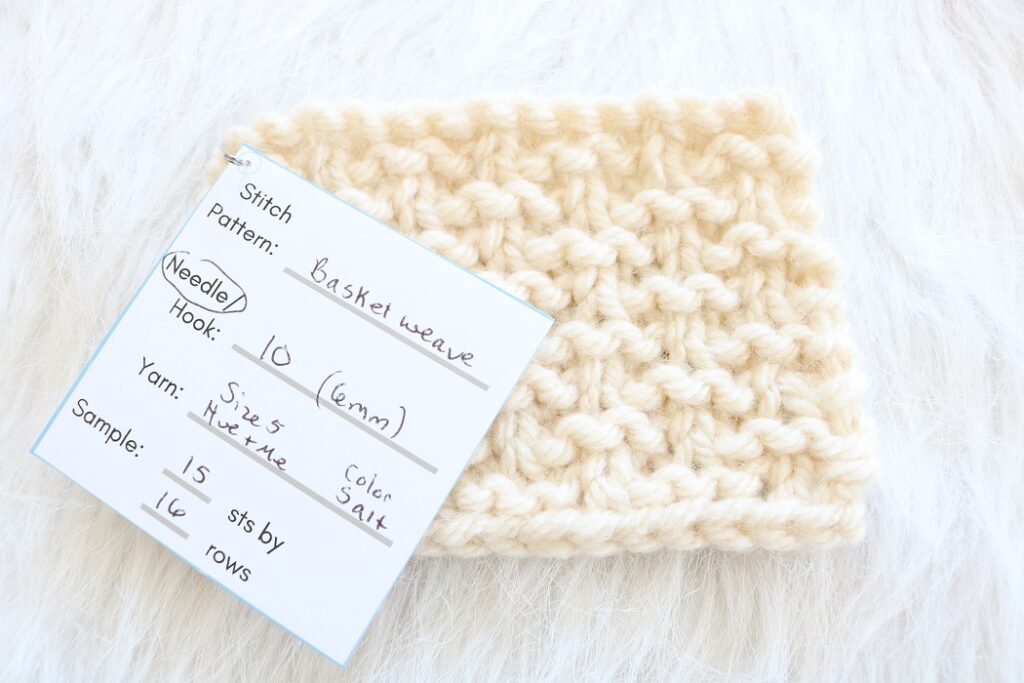
——————————————————————————————————————–
If you enjoyed this list of knitting stitches for beginners, be sure to share it with your knitting friends!
===> Remember to PIN for later! <===
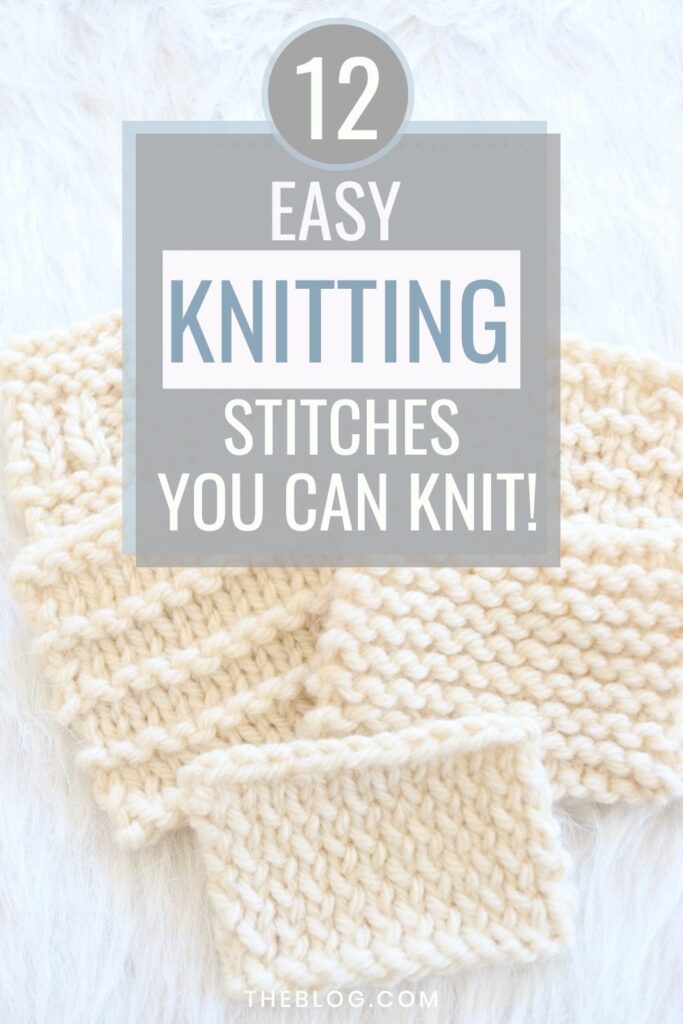


4 Comments
Jeanie
How rude does people have to be. I am offended for you that someone would tell others to go to YouTube when this is your site.
Some people makes a living by showing others their knowledge. I appreciate that.
Do not explain yourself to rude people. They are either ignorant about what they say and would it hurt someone.
I would delete her comment.
Susan
Thanks for the support. I appreciate that I can’t please everyone, but doing my best to encourage those who love to knit and crochet. 🙂
Cindy
People really don’t need to pay for a course. Youtube offers all the videos to learn to knit and crochet for free.
Susan
Yes, Youtube has tutorial videos but they also come at a cost (that’s not monetary – mainly, your time). The benefit of a knitting course like mine is that you are guided through one specific project from start to finish, covering any particular hurdles you may encounter along the way, and including bonus materials with specifics on supplies, gifting, & planning, as well as support from one central source. I also cover how to read a knitting pattern. The skills you learn will greatly benefit future knitting projects as well. All that without annoying ads. I think it’s a great value! 🙂